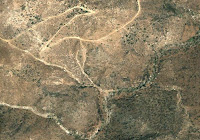Actually most of my friends think I'm crazy, so my Estonian friend has no particular distinction in that regard.
I've long been fascinated that reasonable people can look at the same exact facts and arrive at completely different conclusions. The great Japanese director Akira Kurosawa explored this in his famous movie Rashomon, in which a crime (rape and murder) is viewed very differently by four different people.
My Estonian friend and I have had a long, intermittent correspondence that's a good example of the same phenomenon. Here's an email I received from him after he read some of my recent blog postings:
Still disagree! Yes, Taliban-driven Afgan was awful, but they put at least some control over drugs production. Right now everyone in Afgan plating opium poppy. In other words, from aside, your war in Afgan could be presented as drug-dealers-sponsored.
Also, I can not buy a democracy export, especially when civilians were killed instead of regular army solders, like it was in Yugoslavia and Iraq
Now, in Kosovo Muslims are killing or segregating Serbs under your country protection and Muslim Terrorists camps spread over Kosovo as mushrooms after the rain
What the democracy is it?
Here is Baltic the same. No one killing Russians, but We are kind of "€œoccupants"€, but WWII SS "€œveterans"€ are "€œfighters for freedom" Sux!
In Ukraine, with their Orange revolution, totally sponsored by USA, already started to prohibit Russian language! This is "€œyour" democracy?
Let'€™s forget this "€œdemocracy" shit and switch on simple and understandable matter Money (BIG Money) and "€œUSA area of interests" at least we'€™ll be honest to each other.
Sorry, if was little bit brutal.
My friend is worried about being "brutal," which made me smile — his rhetoric is very reasonable and calm compared with what Americans went through in the 2004 election! But take a look at the rest of his points...
My friend looks at Afghanistan and sees that the war caused a horrible problem: the opium growers that were more-or-less successfully suppressed by the Taliban are now back in business in a big way. His conclusion: the world was better off (and maybe the Afghans as well?) under the Taliban; we shouldn't have fought that war.
I look at Afghanistan and I believe the same underlying facts as he: that the Taliban did successfully suppress the opium poppy growers. But...that's a trade I'm very happy to make. First, I think the opium problem is a much less consequential and much more tractable problem than was the despicable Taliban. Everything I've been able to read coming out of Afghanistan shows that the people there (including even many former Talibani!) are very happy to have the Taliban lifted off their shoulders, and are very happy to be in a democracy. In other words, the Afghani people are far better off post-war than pre-war. Similarly, I see those same facts and believe that the rest of the world is also far better off without the Taliban's active support and refuge for some of the world's worst terrorists.
Certainly my friend and I get our information in different ways, and form our beliefs in different ways. But fundamentally we don't disagree over the facts — we disagree (when we do) instead over which "facts" to believe and how to interpret their meaning.
My friend has a very sour view of events in Kosovo. On these facts, I can't really comment, because I don't know much about the situation there. One piece of his comment is very interesting, though: he believes it is America who is responsible for the protection. But the peacekeeping operation in Kosovo is very much a U.N. operation; last I heard it was under the command of a French general, and included substantial numbers of European and Russian troops, with the U.S. contribution being a minority. And it's a well-documented fact that the intervention in Kosovo was initiated by Western European countries, though certainly that intervention had official (though not popular) American support. I have no idea why my friend believes it is an American operation, or how he came to hold that belief — but isn't it fascinating simply that he does?
My friend says that he doesn't think exporting democracy is worth it if civilians are killed, rather than regular army soldiers — and he believes that mostly civilians were killed in Yugoslavia and Iraq. Again, I don't know about Yugoslavia well enough to comment, but Iraq is a different story altogether. My friend is believing different facts than I do, and in this case I think I know where his information is coming from. There were many early reports from post-war Iraq about large civilian casualties during the war. But every single investigation into these reports has subsequently discredited them — and in fact, even such skeptics as the French and Chinese are now openly acknowledging that the Iraq war was the "cleanest" war ever fought, specifically in terms of minimizing civilian casualties. But that canard about high civilian casualties is still circulating in liberal circles even in the U.S., so it's easy to imagine the same thing is happening elsewhere. Further, I don't think anyone seriously disputes the high civilian casualties under Saddam; these are unambiguously far higher than the civilian casualties in the war. So I don't understand the conclusion from the facts on hand.
But take the point to a higher level, and consider: any violent revolution that occurs without outside military intervention will necessarily incur civilian casualties, for it is the civilians who are rebelling. The early American revolution is a good case in point; so is the French revolution (though I hate to use that as an example for democracy!). So...to say that civilian casualties make a revolution not worth it is the same as saying that no people should ever rebel violently against a tyrant. I'm not sure if my friend agrees with that extention of his own logic, but I certainly do not.
My friend (who is ethnically Russian) looks at the recent events in the Ukraine and says: that's an American-sponsored revolution. I got a big chuckle from that! Most Americans, I'm certain, wouldn't even be able to place Ukraine on a continent correctly, much less find it on a map. Probably most Americans wouldn't even know that Ukraine is a country, or that it used to be part of the Soviet Union. And it's certainly true that the vast majority of Americans still don't know that there was a revolution in the Ukraine, or that the result was a democracy. While it's clearly true that America's official position was to support free and fair elections, and it's also true that many private organizations actively supported the Ukranians who wanted the same thing — from where I sit that's hardly "sponsorship". Rather, it's a case of generous people helping others in need. And certainly America did not send troops, or military support of any kind. In the end, all that happened was that the Ukranian people voted for whom they wanted, and their selected leader is now in power. A good outcome, and I would have applauded that outcome no matter who won; that's how democracy works. But from where my friend sits, obviously the same facts look much different.
On the issue of outlawing language, I have mixed feelings myself based on recent experiences here in the southwestern U.S., where Spanish seems to be displacing English at a very rapid pace. In the Ukraine, the situation is much different, though. I know a few ethnic Ukranians, and the depth of their negative feelings about the Russians cannot be ignored. From this observer's perspective (and I have no axe to grind on either the Ukranian or Russian side of this issue) there is a long and very unfortunate history of Russian/Soviet oppression (I use that loaded word deliberately) in the Ukraine, both against the ethnic Ukranians and the Jews. There is also an unfortunate history of criminality amongst the Ukranians. The two together are a volatile brew, and the results are sadly predictable: a whole population of Ukranians who would like nothing better than to rid their world (or the whole world!) of Russians, and vice versa. I think the language issue in the Ukraine is very much a direct outcome of that history. The group currently in power wants to leverage that power to force their erstwhile oppressors to integrate or leave...and who can really blame them? I think it's at least possible that such a process is the only one likely to be successful, so deep are the divisions...
My friend is utterly convinced that financial interests and direct American interests entirely drive our foreign policy. In previous correspondence, he's told me that he believes the Iraq war was driven largely by our interest in their oil. Again, we're believing different facts: from all the evidence that I choose to believe, America is losing a great deal of money in Iraq — hundreds of billions of dollars. So I can't see how our financial interests are being served. Our oil companies (along with the rest of the world's oil companies) are making a lot of money these days, to be sure — but they're not making it from Iraqi oil. I do agree however, that our foriegn policy is driven by our own direct interests, though I would differ with my friend about what interest we're talking about. I believe our foriegn policy (especially in the Middle East) is being driven by our self-interest in reducing the threat of terrorist attack on our own country. And I think it's working. My friend disagrees on both points.
I'll end this long post on a point where my friend and I have one of our rare agreements, at least partially: the sad irony that in the Baltic states the Balts who joined the Nazi SS are being lauded, while the Russians are reviled as dictatorial occupiers. When I read the Estonian perspective on this topic, it seems to me that it is distorted by 20/20 hindsight: those who joined the SS are justified because they fought the Soviet oppressor. With hindsight, there's at least a grain of truth to this: the Soviets observably did come in and overrun and occupy the Baltic states, and they did it with the agreement (whether tacit or overt) of the Allies, none of whom did anything substantive about it. So in that very limited and warped sense, the SS volunteers were fighting the oppressor. But...at the time that they volunteered, nobody knew this would be the case. All any Estonian could know was that their country was caught between two evil titans. To volunteer to help either one, in my non-Estonian mind, was traitorous. There was in Estonia (and the other Baltic states) a weak but valorous and genuine patriotic defense. In Estonia they mostly hid in the woods and made minor attacks with very limited effect. And their situation was utterly hopeless — outnumbered by many times, poorly supported, vulnerable and with no safe haven. They persisted for many years of the Soviet occupation, and there is a literature documenting their resistance. I could see holding these folks up as heroes. I cannot see holding up the SS volunteers as anything other than traitors to Estonia; likewise those who collaborated with the Soviets. There's another piece of this phenomenon that bothers me as well, which is that "Russian" and "Soviet" seem to be almost synonomous in the Estonian commentary I've read. And of course they are not the same thing at all. I know quite a few proud Estonian citizens who happen to be of Russian descent (which they're also proud of, and that's not contradictory). This is a very familiar phenomenon to Americans, of course...we have many proud American citizens who are simultaneously proud of their heritage. But in the Estonian commentary, this distinction is rarely drawn.



